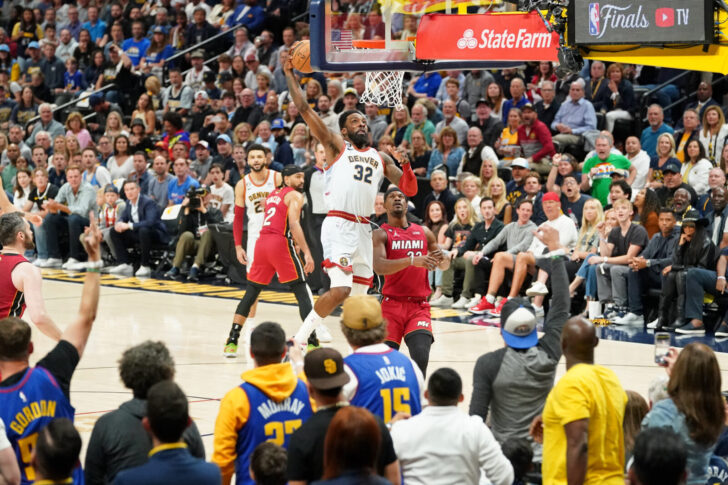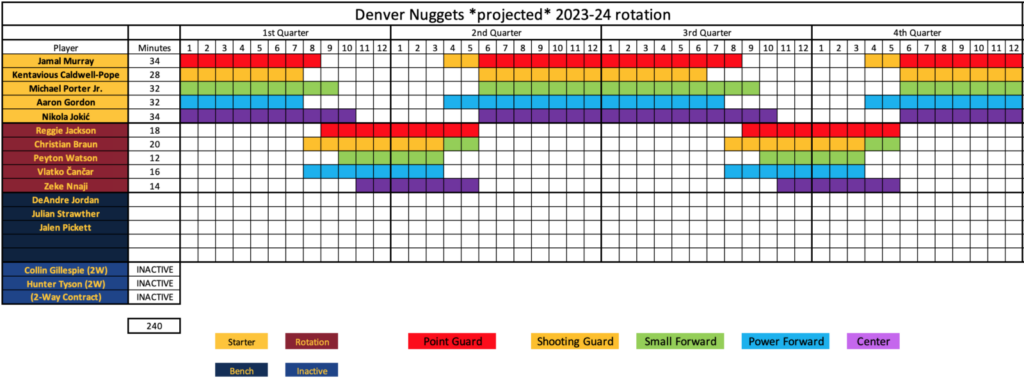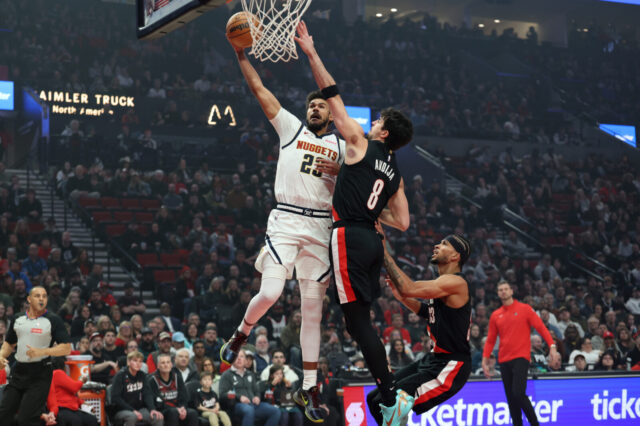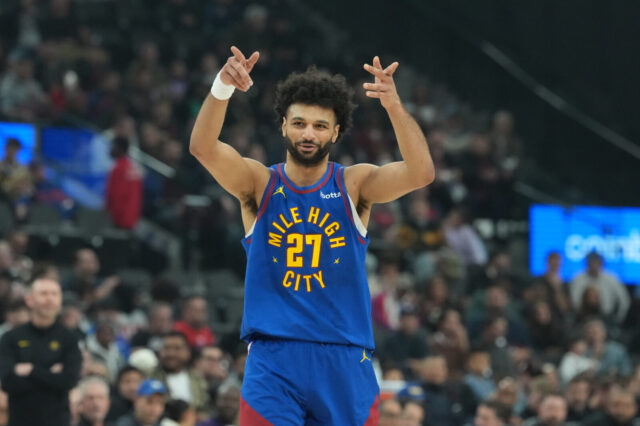After much hemming and hawing about how the Denver Nuggets would replace Bruce Brown, the final answer was: we will figure it out.
Bruce Brown walked away from the Nuggets offer of a one year contract worth $7.7 million, the maximum amount the Nuggets could offer him due to a rule in the CBA known as “Bird Rights.” The Nuggets didn’t have Brown’s bird rights having signed him to a one-year contract in the previous off-season. Had Brown been in a Nuggets uniform for two seasons instead of one, they could have offered him $53 million in guaranteed salary over four years if they so chose.
Alas, the Nuggets were a victim of circumstance here, taking advantage of Brown being on the market last year and signing him to the taxpayer mid-level exception. Brown outperformed that contract and earned the payday he received to go to the Indiana Pacers, a two-year, $45 million deal.
So, the Nuggets focused on retaining some of their other free agents. Reggie Jackson, Denver’s next most dynamic free agent guard, was retained for a two-year, $10.25 million deal with the taxpayer mid-level exception. DeAndre Jordan, one of Denver’s sage veterans who helped tie the locker room together during the championship season, was retained on a minimum contract.
The Nuggets thought they would do something similar with backup power forward Jeff Green; unfortunately, the Houston Rockets trumped Denver’s minimum contract offer, signing Green to a one-year, $6 million deal. Denver was offering Green roughly $3 million, and the Rockets doubled that with their remaining cap space, stealing Green away from the Nuggets bench.
BREAKING: The Houston Rockets have agreed to a one-year, $6 million deal with NBA champion Jeff Green, league sources told @hoopshype. The deal was negotiated by agent Jason Glushon of @GlushonSM.
— Michael Scotto (@MikeAScotto) July 2, 2023
So, the Nuggets lose their sixth man and seventh man to free agency. Brown averaged 26.5 minutes per game during the playoffs, while Green averaged 17.2 minutes per game himself. All of Denver’s starters averaged between 30 and 40 minutes per game, and that lineup remains unchanged heading into the 2023-24 season. Still, the depth in Denver is a little shaky and uncertain at the moment.
The Nuggets couldn’t afford to bring back Brown and Green due to the newest salary cap rule imposed by the NBA: the super tax apron. Effectively, the Nuggets are not allowed to go over the super tax apron, or else they lose certain privileges. Among those privileges is the taxpayer mid-level exception used to sign Jackson. The level of the super tax apron was officially set at $182.7 million prior to the start of free agency.
As of this moment, the Nuggets have 12 players on their full-time roster making an estimated $173.0 million, leaving just under $9.7 million of salary room below the super tax apron. That’s a line that Denver cannot cross legally anymore. It also effectively means that the Nuggets chose Jackson over Green when they signed the 33-year-old point guard to that deal.
All of this to say: Denver’s options in free agency were quite limited this year, and they understood that reality quite clearly. The signs that Denver knew how dire their financial situation was were popping up when Denver made a trade during the NBA Finals to acquire another second round pick. Then, Denver expanded that deal to a four-team monstrosity to end up with three draft picks. General Manager Calvin Booth selected Julian Strawther, Jalen Pickett, and Hunter Tyson in the 2023 NBA Draft, sharing his belief that those three players would be trusted by Michael Malone during the 2023-24 season.
Michael Malone will certainly be forced to consider playing those rookies this year, but the real development should come from the immediate bench. Jackson is a veteran, but the rest of Denver’s projected bench lineup is very young:
Christian Braun was Denver’s eighth man during the playoff run and received some valuable experience along the way. The Nuggets are hoping he can parlay that experience and fast track his development to become a more consistent option. Of course, Braun only averaged 13.0 minutes per game during the 19 of 20 playoff games he played. What happens if the Nuggets double that total to match Bruce Brown’s playoff total? Will Braun be ready for that level of pressure? It’s a tall task.
Peyton Watson wasn’t even a factor in the Nuggets rotation until late March, playing about 50 total minutes during the Nuggets’ first 76 games before playing 134 minutes in the final six games. He averaged 22.4 minutes per game during that stretch, producing 7.5 points, 4.7 rebounds, 1.5 assists, and 1.7 blocks per game. He was active and productive but inefficient as a shooter. Asking him to shoulder a significant role next season means relying on a player with just 186 total minutes of experience in his NBA career. It’s a significant gamble for a championship contender.
Vlatko Čančar is actually the fourth longest tenured Nugget behind Nikola Jokić, Jamal Murray, and Michael Porter Jr., having played 130 games in his NBA career and 60 last season. He has a reasonable amount of NBA and international experience under his belt and would be one of the groups’ veterans, though his actual level of impact has been underwhelming so far. Čančar does some things that good players do as a connective piece, and he can make plays for himself and others when involved consistently. Can he step into Jeff Green’s role? Perhaps.
Zeke Nnaji is perhaps a swing factor for this prospective bench. In his first two seasons, Nnaji spaced the floor beautifully for the Nuggets as a wing, but as he has transitioned to a more natural small ball center role, Nnaji’s consistency with that jump shot eroded. He averaged just 2.6 rebounds in 13.7 minutes per game, a very low rate for a center. The overall impact Nnaji had was more positive though, switching onto guards in pick and roll defense and disrupting opposing offenses more and more frequently. Nnaji is in the final year of his rookie contract, and if the Nuggets go into the 2023-24 season with only Nnaji and Jordan on the roster at backup center, it will be a vote of confidence in the 22-year-old to do what needs to be done.
If the Nuggets roll into next year with a second unit of Jackson, Braun, Watson, Čančar, and Nnaji, it will likely be a bad bench group compared to other teams. The rookies may step up every now and then, and perhaps DeAndre Jordan or two-way contract Collin Gillespie find ways to be impactful. As it currently stands though, the Nuggets second unit is weaker than it was last year when it featured Bruce Brown, and the uncertainty that comes with such a unit will be difficult to navigate in the regular season.
If the Nuggets, as is expected, offer Jalen Pickett a full-time roster spot and Hunter Tyson a two-way roster spot, then the Nuggets will have two more roster spots available. The Nuggets have an estimated $7.9 million in room below the super tax apron, but they only have two ways to add players: minimum contracts and a $9.1 million traded player exception created when Monte Morris was traded last season. The TPE expires on July 6th, so if the Nuggets don’t find a way to use it, they will have just minimum contracts available for a free agent class that has dried up considerably in two days.
How the Nuggets end up filling those final roster spots will be interesting, but they likely won’t change Denver’s projected opening night rotation featuring two 22-year-olds and a 20-year-old. Whether that reality was always the plan or not is up for debate. What’s not debatable is how the newest CBA forced the Nuggets into a corner. It’s a good thing they have Jokić and Murray, who will likely just score anyway.




